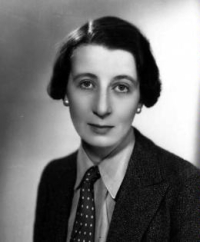
JOSEPHINE TEY (Elizabeth Mackintosh)
Born 23rd July 1896 Inverness, Scotland
Died 13th February 1952
I first bought one of Josephine Tey’s books after reading Julian Symons’ Bloody Murder in which he talks about compiling for a Sunday paper a list of the Hundred Best Crime Stories . He consulted several critics for their recommendations and it was the lover of detective fiction, Howard Haycraft, who asked that Tey’s The Daughter of Time (1951) be included. Symons comments that JosephineTey did write some original stories but that his choice would not have been Haycraft’s. Symons preferred her book, The Franchise Affair. Following Symons’ advice I read it and was hooked.
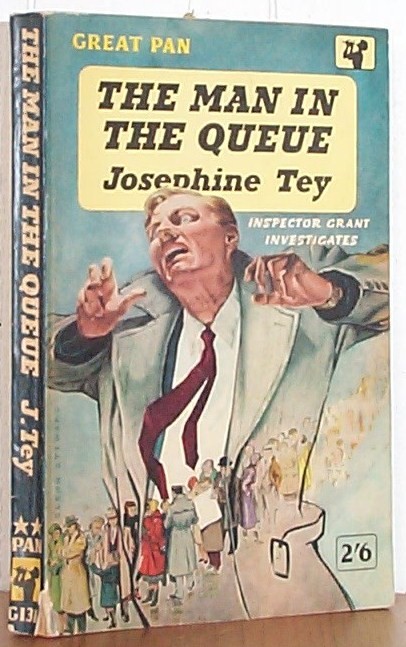 Of course, certain attitudes revealed in her early novels would no longer be tolerated, for example, her use of the word ‘dago’ in her first Inspector Grant novel, The Man in the Queue. Grant assumes that because the man in the theatre queue has been stabbed with a small ‘viperish’ blade the murderer must be a dago.
Of course, certain attitudes revealed in her early novels would no longer be tolerated, for example, her use of the word ‘dago’ in her first Inspector Grant novel, The Man in the Queue. Grant assumes that because the man in the theatre queue has been stabbed with a small ‘viperish’ blade the murderer must be a dago.
‘Idly he considered the type of man it would be. No thorough Englishman used such a weapon. If he used steel at all he took a razor and cut a person’s throat. But his habitual weapon was a bludgeon and, failing that, a gun. This was a crime that had been planned with an ingenuity and executed with a subtlety that was foreign to an Englishman’s habit of thought. The very femininity of it proclaimed the dago, or at the very least one used to dago habits of life. ... he thought about motive; Revenge or jealousy? Most probably - dagoes were notoriously vulnerable in their feelings; an insult rankled for a lifetime, a straying smile on the part of their adored and they ran amok.’
But Josephine Tey is special. Each mystery is fresh and new whether it features her detective, Inspector Grant, or in what would today be called a stand alone. Her plots are interesting, the mysteries difficult to solve, her settings varied and beautifully described, the characters well drawn and her writing elegant, witty and pleasing.
Elizabeth Mackintosh was born in Scotland and her love of her native land is apparent especially in The Singing Sands when she takes a tired and ailing Inspector Grant to stay with his cousin’s family the Highlands for a healing fishing holiday. But she has no truck with jingoism. In the same novel she makes fun of those who preach independence for Scotland by inventing a loony character, Wee Archie, a self-styled saviour of Scotland who rants at Grant mistakenly believing him to be English.
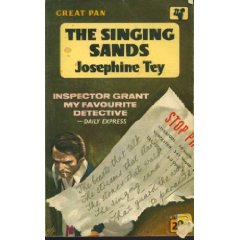
“ Surprised, Grant heard of England’s iniquities to a captive and helpless Scotland. (Anything less captive or less helpless than the Scotland he had known would be difficult to imagine.) England, it seemed, was a bloodsucker, a vampire, draining the good blood of Scotland and leaving her limp and white...There was no cliché that Wee Archie spared them.”
Mackintosh trained at The Anstey Physical Training College in Birmingham but after eight years as a P.T. teacher she returned to Scotland to look after her invalid father and it was here that she began writing. In the thirties, using the name, Gordon Daviot, she wrote a number of successful plays and was very much respected in the acting profession. Both Edith Evans and John Gielgud attended her funeral in 1952. Theatre people and settings, described with a wry lack of sentimentality, frequently pop up in her books. Her first mystery, The Man in the Queue, features the murder of a young man who is queuing up to get into the last night of a marvellous musical comedy; when in the course of his enquiries Grant interviews the star of the show, Ray Marcable, he describes her as ‘one of the most self-absorbed people in this era.’ Grant has a charming and generous actress friend, Marta, who appears in several of the detective books bringing with her an atmosphere of fun and glamour as well as all the latest theatre gossip. It is Marta who sets off Grant’s interest in the princes in the tower. He is flat on his back in hospital after a bad accident and, to save him from the nightmare of boredom, she brings him several pictures of historical figures. Grant, like Lucy Pym in, Miss Pym Disposes believes a person’s character can be deduced from facial features and handwriting. When he studies the portrait of Richard III he decides that the man cannot have been an evil murderer and sets about proving that he was innocent of the crime
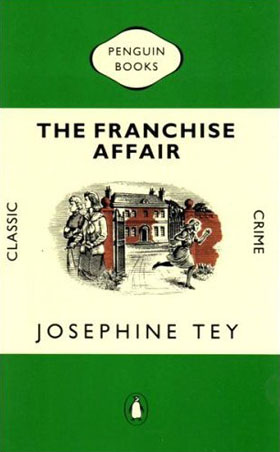 Grant, himself, is an interesting character. Like many of the thirties sleuths, he is brave, a bit of a toff, well educated, liable to quote from the classics and appreciative of men and women of breeding. But he does have some more unusual and endearing qualities. When he inherited a large amount of money he used some of it to set up a released prisoner in a small shop so that he might never sin again. He is kind, loved by his small nephew and admired by Williams, his faithful sergeant. But his main quality is his humanity and hatred of injustice. In The Man in the Queue, through dogged and careful police work he catches the man he believes to be guilty of murder but, once he has listened carefully to his story he begins doubting whether or not he has caught the right man. The fallibility of evidence is a theme dear to Tey’s heart. Grant’s honesty and his conscience prompt him to go on working at the case rather than risk causing an innocent man to be hanged.
Grant, himself, is an interesting character. Like many of the thirties sleuths, he is brave, a bit of a toff, well educated, liable to quote from the classics and appreciative of men and women of breeding. But he does have some more unusual and endearing qualities. When he inherited a large amount of money he used some of it to set up a released prisoner in a small shop so that he might never sin again. He is kind, loved by his small nephew and admired by Williams, his faithful sergeant. But his main quality is his humanity and hatred of injustice. In The Man in the Queue, through dogged and careful police work he catches the man he believes to be guilty of murder but, once he has listened carefully to his story he begins doubting whether or not he has caught the right man. The fallibility of evidence is a theme dear to Tey’s heart. Grant’s honesty and his conscience prompt him to go on working at the case rather than risk causing an innocent man to be hanged.
Another of Josephine Tey’s favourite themes is disguise and deception. In The Franchise Affair, an innocent looking schoolgirl accuses two women of abducting her and keeping her prisoner in the attic of their isolated country house, The Franchise. They beg for help from a solicitor who, in spite of his misgivings, becomes their friend and protector. The mystery revolves round the power of the spiteful popular press, enemy of truth and justice, and ends in a brilliantly staged trial. How can the child be telling lies when she can describe so accurately the house and its garden? For this plot Tey used the true story of an eighteenth century woman, Elizabeth Canning, who claimed that she had been kidnapped, locked away for weeks and and ill treated before making her escape.
Although they may have certain themes in common every book is a surprise. Brat Farrar is the fascinating story of a man fraudulently claiming to be someone else in order to inherit wealth and position. Each member of the family he tries to deceive is beautifully drawn from the young twins to the tough young woman he falls in love with. The background of stables, race meetings and horses is convincing. You don’t need to be a lover of mysteries to enjoy this novel and warm to the characters. By some extraordinary feat, Tey has the reader sympathising with the deceiver and wanting his lies to convince.
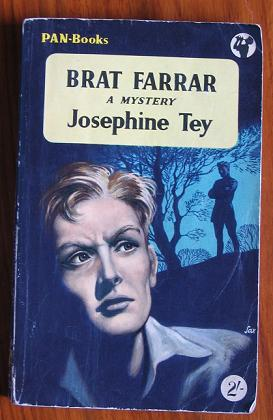
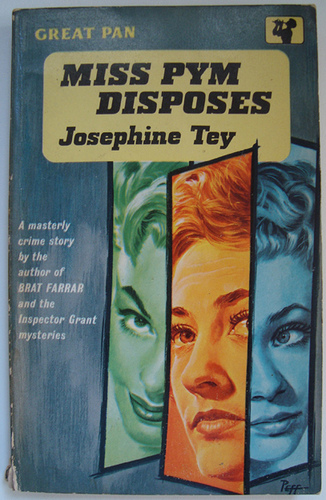
Brat is a charmer but one of my personal favourites is Miss Lucy Pym, the star of Miss Pym Disposes. Because of the extraordinary success of her book on psychology, Miss Pym is able to give up her day job and spend some time visiting a former school friend, now the principal of a women’s physical training college. Josephine Tey’s familiarity with such an establishment allows her to paint a telling picture of the tension and fatigue experienced by the young women in the run up to their final display and examinations. It ends in tragedy but Josephine Tey makes natural justice overshadow the law. Little Miss Pym, a kindly, self deprecating soul with a ‘face like a scone’ makes the right decision.
There are some writers who bring out a book each year, some better than others. I wish that Josephine Tey had written more than these eight but it seems that she rated her plays much higher than her mysteries. In one of her novels she even has a playwright talking scornfully of her detective stories. Never mind. The few she did write are so good that they bear rereading time and time again.
BIBLIOGRAPHY
1929
The Man in the Queue
Gordon Daviot/Josephine Tey
1936
A Shilling for Candles
1946
Miss Pym Disposes
1948
The Franchise Affair
1949
Brat Farrar
1950
To Love and Be Wise
1951
The Daughter of Time
1952
The Singing Sands
In this series so far
PAST MASTERS #1: EDGAR WALLACE
read
go which is better chalis or viagra
reasons why women cheat on their husbands
open what to do when husband cheats
cialis coupons online
read prescription savings cards
how many abortions can a woman have
site abortion clinic in atlanta
discount coupons for prescriptions
activeslo.com cialis manufacturer coupon 2016
amoxicillin dermani haqqinda
amoxicillin amoxicillin 500 mg
naltrexone studies
go low dose naltrexone contraindications
depade naltrexone
link revia and alcohol